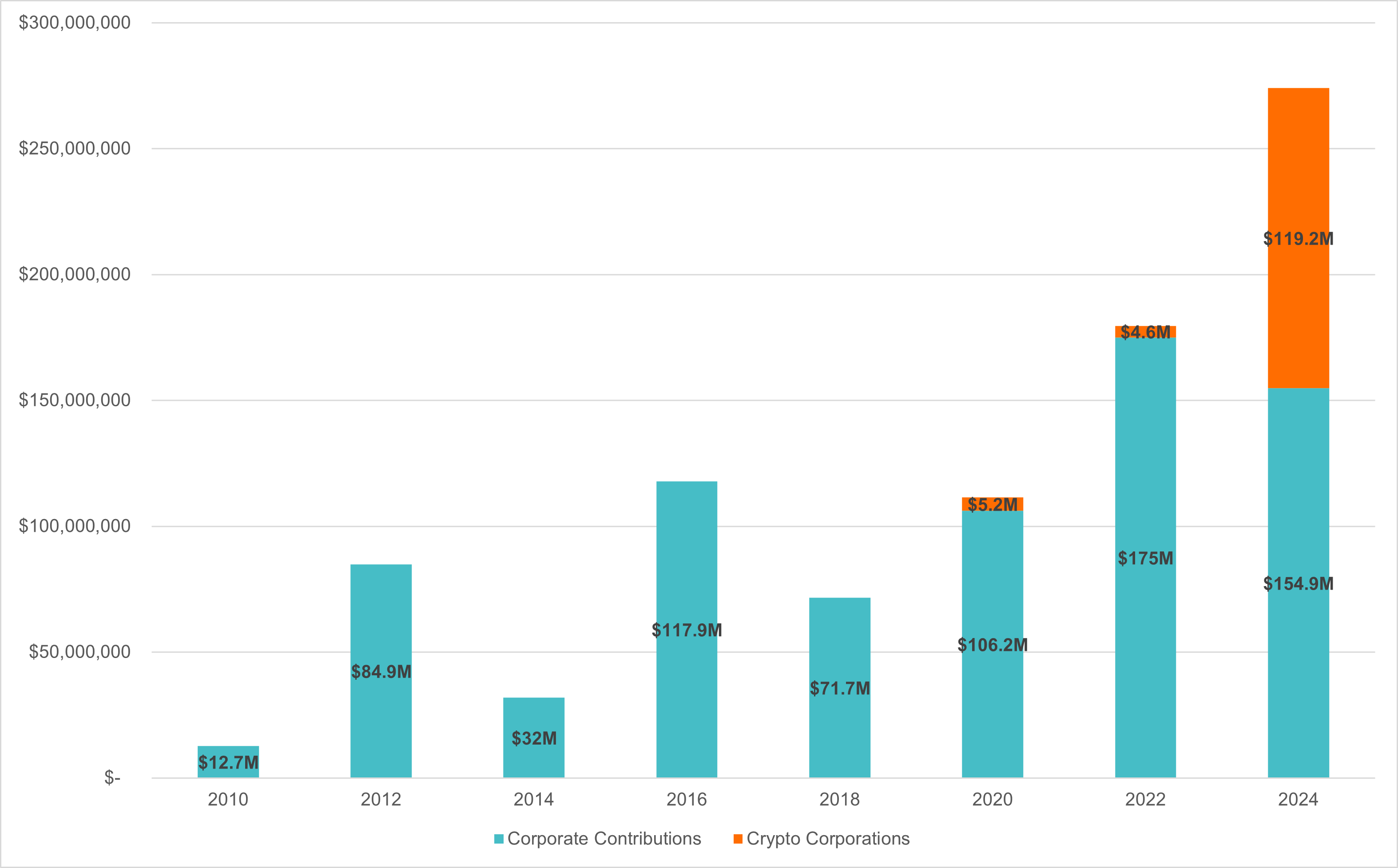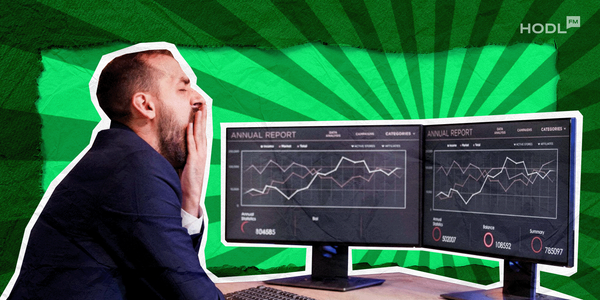With the US election on the 5th of November (which is only in 6 days), the world is closely watching as Kamala Harris and Donald Trump go head-to-head in a tight race. This time, crypto enthusiasts are paying special attention, curious about how either candidate’s presidency might impact the future of digital assets.
Let’s take a closer look into the possible scenarios that could unfold under a Harris or Trump administration and examine their potential impacts on the crypto.
Harris and Trump on Crypto: Where Do They Stand?
If you take a look at the chatter on X (formerly Twitter), the initial impression is that Trump is more pro-crypto, while Harris is viewed as cautious. That said, Harris has recently shown interest in appealing to crypto voters, suggesting she may be warming up to the industry.
Why the shift? It’s likely linked to a recent report by Public Citizen that reveals crypto firms have spent nearly $120 million on federal elections this year, which amounts to about 44% of all corporate funding for Political Action Committees (PACs) in 2024.
Despite different approaches, neither candidate can slow the accelerating adoption of blockchain technology and cryptocurrency in the US, which may ultimately outlast any short-term political changes.

What a Trump Presidency Could Mean for Crypto
Though once skeptical of Bitcoin, Donald Trump has now embraced it.
I am not a fan of Bitcoin and other Cryptocurrencies, which are not money, and whose value is highly volatile and based on thin air. Unregulated Crypto Assets can facilitate unlawful behavior, including drug trade and other illegal activity....
— Donald J. Trump (@realDonaldTrump) July 12, 2019
At the Bitcoin Conference in Nashville this past July, Trump delivered a keynote speech in which he criticized current US crypto regulations, promising to make the US a global “crypto capital.” He even pledged to replace the current SEC chair, Gary Gensler, with someone more favorable to the crypto sector.
Trump emphasized, “Regulations should be crafted by those who support this industry, not those who oppose it.”
His pro-crypto stance is further backed by his own venture, World Liberty Financial, a crypto platform co-managed by his sons, Donald Jr. and Eric Trump. Sources claim World Liberty is developing its own stablecoin, although Trump himself has been vocal about opposing a Federal Reserve-backed Central Bank Digital Currency (CBDC).
With influential support from figures like Elon Musk, Trump’s platform hints at a possible regulatory overhaul that could favor digital assets.
“Maybe we’ll pay off our $35 trillion debt by handing them a little crypto check, handing them a bitcoin”
— Bitcoin News (@BitcoinNewsCom) October 25, 2024
Depending on what happens in 10 days, ideas like this could be in the White House next year 👀
pic.twitter.com/kla76cEi8E
Harris’ Approach to Crypto: A Balancing Act
As the VP, Harris has kept a relatively low profile on crypto until recently. By late September, she publicly announced her support for digital currencies as part of her “Opportunity Agenda,” a platform promoting technologies like AI and digital assets.
However, her stance remains somewhat cautious, with no formal roadmap for regulatory clarity. Her potential alliance with crypto advocates, tempered by ties with figures like Congressman Brad Sherman, who is openly critical of crypto, leaves her stance somewhat ambiguous.
Harris’ actions indicate she might be trying to strike a balance between pro-crypto sentiments and existing regulatory stances. However, Sherman suggests that despite the influx of crypto donations, Harris may still hold firm on regulatory issues after Election Day.
Over 75,000 Americans turned out for @KamalaHarris
— Kamala HQ (@KamalaHQ) October 29, 2024
🇺🇸🇺🇸🇺🇸 pic.twitter.com/6QpC3TnqrP
The Bigger Picture: Crypto’s Inevitable Growth
Even with varying degrees of support, neither Harris nor Trump would likely disrupt the momentum of the crypto industry. Key figures within the sector, such as the Winklevoss twins, have even donated millions in Bitcoin to Trump’s campaign, accusing the Biden administration of hostility toward crypto.
Though recent polls suggest Harris leads Trump by a slim margin, the blockchain-based prediction platform Polymarket places Trump as the frontrunner with a 66% chance of winning, based on nearly $1 billion in bets from users.
Regardless of the outcome, crypto’s advancement in the US will likely continue. The industry’s rapid growth and increasing integration into mainstream finance underscore its durability, promising further evolution irrespective of political tides.

Quick Q&A on the Future of Crypto Post-Election
Which candidate is considered more pro-crypto?
Donald Trump is generally seen as more pro-crypto, advocating for lighter regulation and actively promoting blockchain innovation. However, this doesn't necessarily mean that the crypto industry will feel better under his administration, as regulatory changes can be unpredictable, and other factors may influence the market's stability and growth.
Has Kamala Harris openly supported cryptocurrency?
Harris recently voiced support for developing technologies, including crypto, but has not shared detailed plans for crypto regulation.
What impact could Trump’s own crypto venture have on the industry?
Trump’s venture, World Liberty Financial, signals his commitment to the industry, though it may raise questions about conflicts of interest should he be elected.
Will crypto regulations likely change drastically under either candidate?
Significant shifts are possible under Trump, who has pledged a pro-crypto regulatory overhaul. Harris’ approach is less clear, though some change could happen as she seeks to balance regulatory concerns with industry growth.
What happens if neither candidate fully supports crypto?
Given the rapid adoption and growing role of blockchain technology, the industry is expected to continue growing with or without explicit support from either administration.
Is the crypto industry’s growth reliant on political approval?
Not entirely. While supportive policies can accelerate adoption, crypto’s underlying momentum and increasing integration suggest it will thrive regardless of the election’s outcome.
Who has invested the most into crypto in this election cycle?
Crypto firms have spent approximately $120 million on this election cycle, with major contributions coming from top companies and influential figures like the Winklevoss twins.
How does the prediction market view the election outcome?
The blockchain-based prediction platform Polymarket currently gives Trump a 66% chance of winning, indicating strong support within the crypto community for his candidacy.
Disclaimer: All materials on this site are for informational purposes only. None of the material should be interpreted as investment advice. Please note that despite the nature of much of the material created and hosted on this website, HODL FM is not a financial reference resource and the opinions of authors and other contributors are their own and should not be taken as financial advice. If you require advice of this sort, HODL FM strongly recommends contacting a qualified industry professional.




